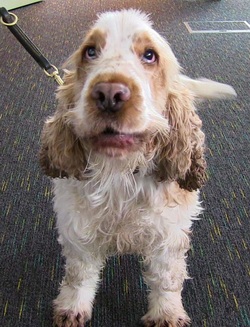
Can you put yourself in the mind-set of a dog and what happens when you do? Attempting to do so is particularly revealing as it requires us to adopt a different perspective to the World, the ways that we see things and the ways that we respond, our encounters and most importantly it challenges our thinking.
Let’s look at the process by which we are moved from our ‘hedonistic relationship’ to one which is about making connections. By adopting the stance of a dog and trainer, with only the reward and feedback of a ‘clicker’, it demonstrated that we enter spaces with strong pre-conceptions and a familiarity that was lost. The room changed from a familiar place to one of complete mystery, challenging and uncertain, sensory cues were limited, a new communication of ‘clicks’ was our only feedback, we looked at this small portion of the world from a different perspective. We considered and experienced the interdependence of the dog, trainer, user partnership, the connections made in ways not previously appreciated causing us to question how biased are our existing relationships, and how limited is our communication.
Through the involvement of a third party with different physical and social expression, the dogs, it was possible to explore communications, actions and needs from another basis. How did it affect me? It opened up new perspectives requiring/forcing me to consider sensory cues, interaction with the environment. It opened up new possibilities for design options, alternative needs and approaches.
Can learn about social and community connections from wider animal worlds? Let us think of a parallel situation, we look to nature for inspiration regarding technology, drug development and art. In the same way, we should be looking at/turning to natural systems and natural relationships from the animal world to examine their societies, relationships and responses in the pursuit of understanding our own society and relationships with anticipated equally informed and dramatic results from which we will learn more about ourselves and how to live in the World. This seems to be a natural progression for society as we continue to explore our own human condition within non-human communities.
Many thanks to the ‘Dogs for the Disabled’ an eye opening two days!
 RSS Feed
RSS Feed
